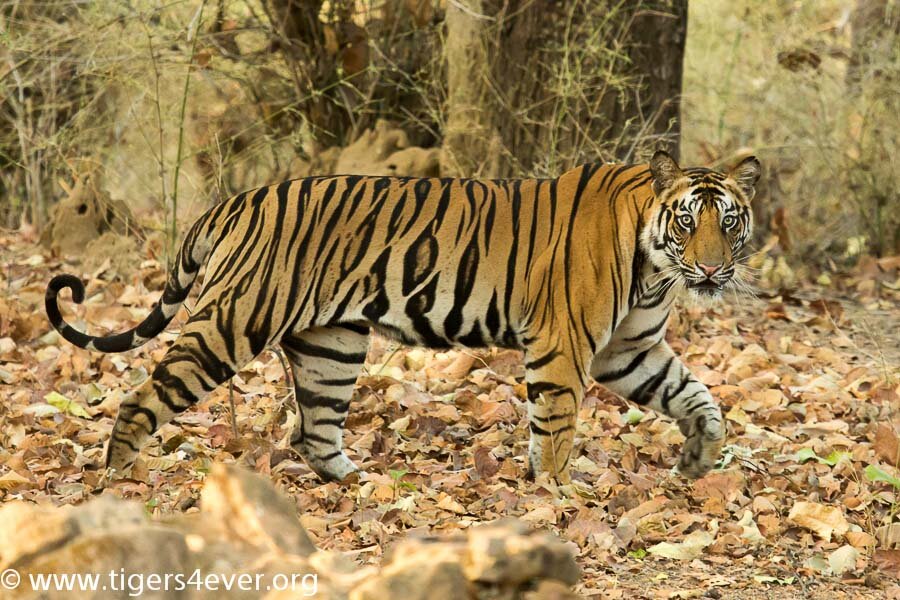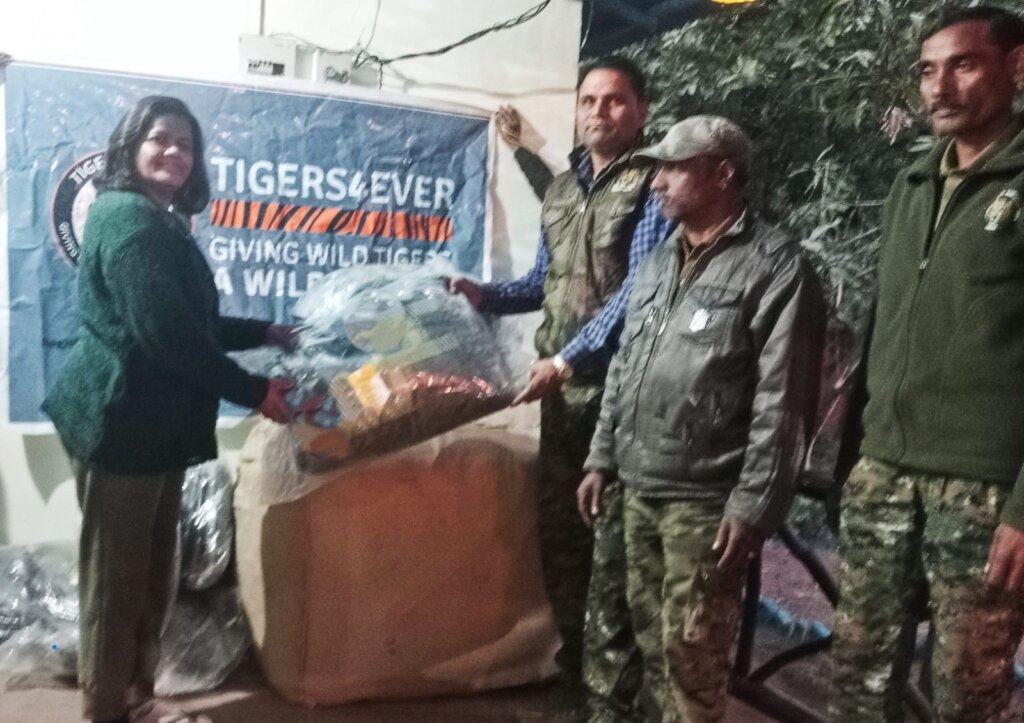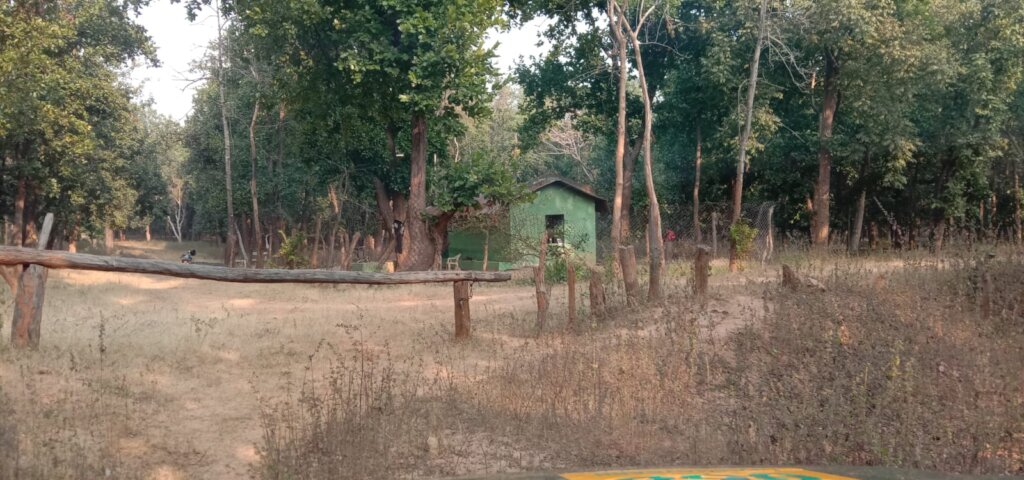By Dr. Corinne Taylor-Smith | Project Leader
We are grateful for your tremendous support for our anti-poaching patrols, especially during these challenging times. Your help and generosity enabled us to maintain quadrupled patrolling throughout the 2023 monsoon period, which was also peak poaching season. As a small charity, we rely heavily on individual donors like you to deliver our essential services. Your donations are vital in ensuring that the growing wild tiger and cub population continues to get the best protection we can provide.
Conflict and Deaths are on the Increase
In July 2023, the results of the 2022 Tiger Census were announced, confirming that three-quarters of all the wild tigers on earth roam freely in India. The census confirmed 3167 wild tigers in the whole of India (785 of which are in Madhya Pradesh, which makes it the Tiger State reflecting the largest state population). The wild tiger population in Bandhavgarh has quadrupled from 37 in 2010, when our efforts to give them a wild future commenced. Success which we couldn’t have achieved without your help.
However, the number of wild tigers dying is increasing too. As wild tiger numbers grow, there will always be an increase in the number of natural deaths because more wild tigers need more wild space, and fights for territory become more frequent. This is the lore of the jungle and is something which is hard to curb without forest expansion or improvement schemes. We have been working behind the scenes for some time on forest rehabilitation initiatives, but launching such a large project during a cost-of-living crisis could see it fail before it even begins to make a real difference. We’ve not given up hope, and we continue to search for funding which will make it possible. Meanwhile, we are working to improve the existing wild tiger habitat to try to reduce both human-wildlife and tiger-tiger conflict through our waterholes project:https://www.globalgiving.org/projects/water-for-bandhavgarhs-tigers/. Enhance protection for the wild tigers and their habitat is ensuring that more cubs are surviving which means more protection is needed and importantly the number of wild tigers will exceed the carrying capacity of the current habitat. At this point we will reach a critical impasse in both human-wildlife and tiger-tiger conflict.
Since the beginning of 2023 there have been 163 reported wild tiger deaths in the whole of India (NTCA statistics 10 December 2023), of these 31 have occurred since our last report including 2 in Bandhavgarh. Both of the deaths in Bandhavgarh were due to tiger-tiger conflict within the reserve. Thankfully, our patrolling is keeping unnatural deaths at bay in Bandhavgarh right now, but we cannot afford to let down our guard as poachers are always seeking opportunities to strike. Thanks to your kind donations and a grant from the Marjorie Coote Animal Charity Trust we have secured funds for increased patrolling into January 2024. We’re hoping that our supporters who receive GlobalGiving gift cards will also choose to help our anti-poaching patrols to keep wild tigers safe throughout the festive period (https://goto.gg/28767).
Human deaths are on the increase too, since the start of the monsoon 6 people from a single village have been killed by wild tigers, most recently two farmers who were grazing their cattle in the forest when attacked in September. The average number of people usually killed in the whole of Bandhavgarh hasn’t exceeded 6 for many years, this year it definitely will! As you can no doubt imagine these deaths have resulted in significant unrest in the villages and, with it the risk of retaliatory attacks on tigers by angry villagers has increased a thousand-fold. Three different tigers have already been implicated in these killings. Two young male tigers were recently captured by the forest department and transferred to Van Vivar in Bhopal where they will spend the rest of their lives. The third tiger implicated was a tigress who has four sub-adult cubs, three daughters, and a son who was one of the tigers transferred to Van Vivar. This tigress has also been captured and incarcerated by the forest department leaving her young daughters to fend for themselves. The fate of her daughters remains uncertain as they will need to hunt for themselves and stay as a group for protection for around a year until they are old enough to defend themselves and their territory. Whilst their father is around, they have some protection from intruding males looking for a mate, but male tigers have several mates and do not give their cubs the same protection as their mothers would. This is human-tiger conflict at the extreme level. It is also a challenging and dangerous time for anti-poaching patrollers too, after all they are the tiger protectors and villagers are known to exact revenge on patrollers too. Our patrols must remain extra vigilant at all times whilst trying to restore a semblance of calm. We have rolled out our forest safety education training and banners in this village and those nearby to try to reduce the risk of further deaths of whether humans or tigers.
Our patrols continuously report the removal of wires and snares set to capture wild boar and other prey animals which enter the villages to raid the farmers’ crops and livestock fodder. These wires and snares are indiscriminate and have killed tigers and their cubs in the past too. Precious tiger lives can easily be lost when they follow their prey into the villages in search of food. This is why our projects to reduce human-wildlife conflict form a fundamental cornerstone of our efforts to keep wild tigers safe.
Where possible, we fight hard to keep both tigers and their prey out of the villages as this reduces the risk of retaliatory poisonings too. During the monsoon season it was quite challenging when heavy rains washed away forest tracks and roads, making some areas impossible to access without appropriate waterproof kit for foot patrols. Thankfully, thanks to your donations and the grant from Olsen Animal Trust, mentioned in our previous report, 1005 anti=poaching patrollers and rangers have been fully equipped with full sets of waterproof clothing, which made the treks through deep water safer and more bearable.
As the tough winter patrolling conditions are now upon us our focus now is on providing warm winter jackets for the remaining patrollers who are without them: https://goto.gg/56553. Since August we have provided warm winter jackets for a further 160 anti-poaching patrollers meaning that 515 patrollers are currently benefitting from Tigers4Ever warm winter jackets. Sadly 490 patrollers desperately need warm jackets still.This week we have placed an order for a further 285 warm winter jackets, thanks to recent donations, grant funding from the Marjorie Coote Animal Charity Trust and grant funding from the Thin Green Line. This means that 800/1005 anti-poaching patrollers will have Tigers4Ever winter jackets to keep them warm thanks to your kindness. It would be amazing if we could raise sufficient funds (£4510/US$5865) during this December to ensure that every anti-poaching patroller and ranger was warm this winter, however, we appreciate that this is an expensive time of year for all, and the cost-of-living crisis is still biting hard. https://goto.gg/56553.
Strange December Weather
We previously reported the strange weather patterns which we have seen in Bandhavgarh throughout this year with heavy rainfall coming in bursts from the end of March onwards. Now we have seen continuous rainfall for four days in December too! Not only is this very rare, it has also meant even colder conditions than normal for our patrollers. It is too early to say whether these strange weather patterns are here to stay or not, but it does mean that we need to be ready for additional challenges not usually seen at this time of year. These challenges include treacherous conditions underfoot, poachers’ footprints washed away and the possibility of increased unseasonal snake activity too. It also means that there has been a greater need for the waterproof clothing, boots and snake rescue kits which we have provided throughout 2023. The expected prolonged period of colder weather has already arrived with the winter season beginning before December this year. Increased patrolling and strange weather patterns mean that patrolling equipment needs are constantly changing and increasing too:https://goto.gg/56553. Each $30 (£22) donation we receive will ensure that we can protect one anti-poaching patroller from the bitter cold winter conditions of early morning and night patrolling. Every warm jacket means one more patroller can walk a patrolling beat and keep wild tigers safe.
Heavy rains make conditions underfoot much more treacherous for both foot patrolling and the patrolling vehicle. They also wash away footprints which makes tracking poaching activities more difficult. Thunderstorms often disable power lines which poachers can use to their advantage when tethering snares and disguise the power outage as weather related. This is why increased patrolling is absolutely essential throughout the year now (https://goto.gg/28767).
More Challenges Ahead
We don’t currently have either the funds or patrolling resources to expand the area which we patrol, as our team is already stretched to the limit with the increased patrolling workload. It is a dilemma; we don’t want to lose more migrating tigers but we also don’t want to reduce the protection in the areas we currently patrol. Just to add another 78 miles (125km) to our patrolling area would cost another £123 (US$160) per day, which right now is impossible. (https://goto.gg/28767).
Fundraising to cover our current patrolling costs is quite challenging so we don’t anticipate being able to extend our patrolling further before the end of the cost-of-living crisis. We know that the poachers know that most of the cubs born during the pandemic are now old enough to leave their mothers’ protection and make their own way in the world. These vulnerable youngsters will face many challenges in their quest for a territory to call their own, not least sibling rivalry and aggression from their own parents. They will also face battles with other young adult tigers seeking to establish their own territories and other adult tigers which have already staked their claim. As these young tigers migrate further afield, our brave men and women patrollers will risk their lives to keep them safe. It will be quite a challenge to protect them all! We are proud of our patrollers and their amazing efforts to keep wild tigers safe. During the last 3 years their workload has increase 3-fold and our patrollers have responded with outstanding efforts and hard work whilst poaching activity around India has reached a 15 year high. It is a miracle in such circumstances that we have been able to keep so many wild tigers safe!
Increasing Awareness
A lack of volunteers in Bandhavgarh meant that we had to ask our patrolling team to go that extra mile and help us to deliver forest safety education messages and banners to the villages whilst they conduct their patrols. Their dedication to duty is second to none, they took the extra workload on with a smile. So far, they have delivered forest safety education talks in 45 villages and erected the banners so the message stays after they have left. Our patrollers have also put-up banners at key forest outposts where we know that humans pass through on their way home or in pursuit of other daily activities. Delivering the messages will ultimately save lives and we hope if funding can be obtained that we can roll-out the bi-lingual educational resources with forest safety infographics beyond the boundary of Bandhavgarh too. We still want to develop an audio resource for use in the future which can be delivered by volunteers in the villages as part of a wider awareness and environmental protection programme. Our priority right now is to deliver the safety education messages to another 60 villages first.
What Else are we Doing to Help
The recent increase in both human-wildlife conflict and Tiger-Tiger conflict around Bandhavgarh is a major concern, as highlighted above. As the wild tiger population continues to grow, the struggle to find sufficient territory to call home will intensify, and conflict incidents will increase in frequency, until more water and habitat can be provided to curtail it. We had to pause our work to provide two more permanent wildlife waterholes due to the monsoon rains, as we reported previously, however, we hope to get things back on track in the next few weeks. Unseasonal rainfall at the beginning of December proved to be an unexpected obstacle to works restarting! Our initial priority is to repair 3 waterholes damaged during the unseasonal and monsoon rains during 2023 and then prioritise work at the new waterhole site in the Dhamokhar Buffer where many tigers live on the periphery of the core zone and human settlements. Hopefully, we can start work on this waterhole very soon. (https://goto.gg/34315).
When conflict incidents are coupled with the increased risk of poaching activities, it means that our patrollers have to be on high alert at all times. We must, therefore, ensure that we can maintain a minimum of tripled patrolling especially throughout the next six months when we know that the poachers will be very active. https://goto.gg/28767.
Making a Difference
Thanks to your continued support, we cover an extra 1800 km (1135 miles) of wild tiger territory per month with our tripled patrols. Without the vital equipment needed to beat the winter weather conditions, this could reduce until the warmer drier weather returns. During the patrolling, it is essential to ensure sufficient time to search for snares; traps and signs of poisoners around forest areas where human encroachment is widespread as poachers are more active. We also need to maintain our patrols around the periphery of villages where crop raiding and livestock killing is also rife. Our increased patrolling helps us to curb human encroachment into wild tigers’ territories and allows us to provide safety advice for those trying to protect their crops and livestock from wandering elephants and tigers respectively.
With more than half of the 60 tiger cubs born during the pandemic now young adults, we have many more wild tigers to keep safe, so your help is crucial. Only this month, we have received news of 8 more precious small cubs from two tigresses which will need our help too. Your gift, however large or small can make a huge difference as to whether Bandhavgarh’s wild tigers can survive the unprecedented threats they face:
Making your Gift Count Twice or More
Your new online monthly gift of £12 (US$16) per month won’t just help us to pay an anti-poaching patroller to protect wild tigers for 35 days per year; it will also qualify for a 100% match bonus on the first donation amount if you keep donating for 4 months or longer. That means when you donate at £12 (US$16) monthly in month 4 we will receive an extra £12 (US$16) from GlobalGiving to help us save wild tigers. Thus, there has never been a better time to start a new monthly donation than now. (https://www.globalgiving.org/projects/saving-bandhavgarhs-wild-tigers/?show=recurring).
Without our help, we know that more wild tigers will die; and more humans will be mauled or killed due to encroachment or human-tiger conflict. Sadly, with every human life lost comes another threat to the wild tiger’s survival in the form of retaliation; thus we must protect both if we are to ensure that wild tigers can have a wild future.
Please don’t hesitate if you can help, your donation can be the difference between life and death for a wild tiger, as it helps to increase our patrolling when it is most needed. Every tiger and every tiger cub counts. Thank you for making our fight against poachers, the changing climate and human-animal conflict possible. (https://goto.gg/28767).
Links:
Project reports on GlobalGiving are posted directly to globalgiving.org by Project Leaders as they are completed, generally every 3-4 months. To protect the integrity of these documents, GlobalGiving does not alter them; therefore you may find some language or formatting issues.
If you donate to this project or have donated to this project, you can receive an email when this project posts a report. You can also subscribe for reports without donating.
Support this important cause by creating a personalized fundraising page.
Start a Fundraiser

